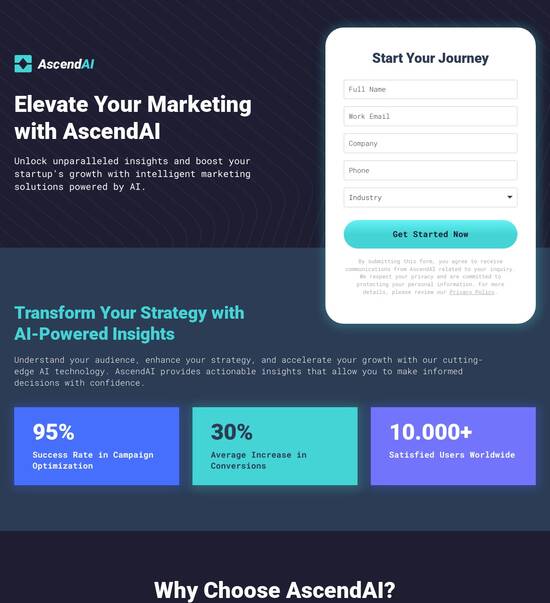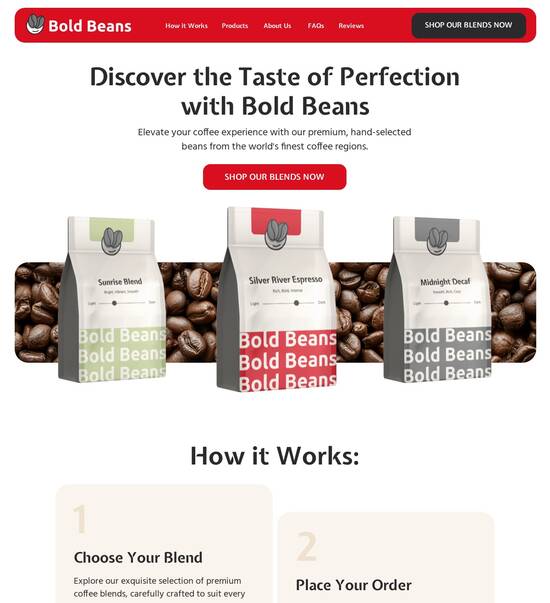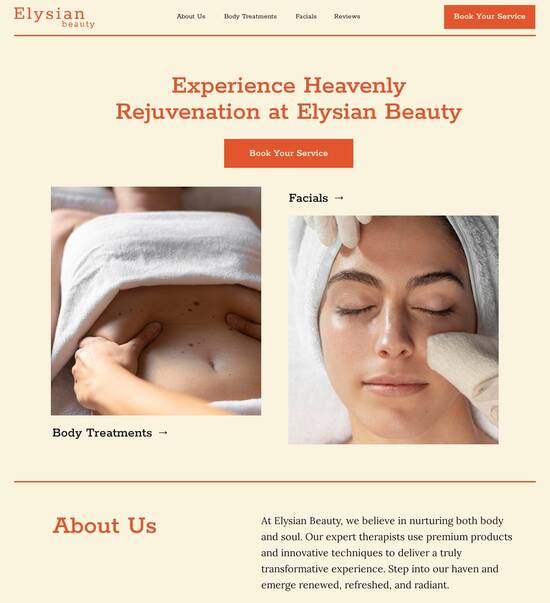
Splash page template optimized for Brave
Explore Similar TemplatesAbout template
Make sure your audience views your landings the way you intended and create splash page template optimized for Brave
Recommended templates

Easy to build without coding
With the intuitive drag-and-drop builder, anyone on your team can create high-converting pages without any knowledge of code or design. Make enhancements to your landing page with custom widgets using Javascript, HTML/CSS, or third-party scripts.

Multiple layouts for any industry and goal
Select from 500+ landing page layouts built to boost conversions across industry-specific scenarios. Customize them by adjusting fonts, adding images, and generating on-brand content with the AI assistant. Quickly scale with Instablocks® and Global Blocks that you can save, reuse, and update globally.

Loads fast and looks polished on any device
Every template is responsive, which means they present professionally on any device and load blazingly fast with our Thor Render Engine. You can also power them up with Google AMP technology to deliver an unparalleled mobile experience and drive higher conversions.

Robust analytics & experimentation
Get real-time updates and reporting across all your devices, showing the number of visitors, conversions, cost-per-visitor, and cost-per-lead. Launch AI-powered experiments, run A/B tests, and use heatmaps to analyze user behavior, then optimize your landing page to maximize conversions.







Easy to build without coding
With the intuitive drag-and-drop builder, anyone on your team can create high-converting pages without any knowledge of code or design. Make enhancements to your landing page with custom widgets using Javascript, HTML/CSS, or third-party scripts.
Multiple layouts for any industry and goal
Select from 500+ landing page layouts built to boost conversions across industry-specific scenarios. Customize them by adjusting fonts, adding images, and generating on-brand content with the AI assistant. Quickly scale with Instablocks® and Global Blocks that you can save, reuse, and update globally.
Loads fast and looks polished on any device
Every template is responsive, which means they present professionally on any device and load blazingly fast with our Thor Render Engine.
Robust analytics & experimentation
Get real-time updates and reporting across all your devices, showing the number of visitors, conversions, cost-per-visitor, and cost-per-lead. Launch AI-powered experiments, run A/B tests, and use heatmaps to analyze user behavior, then optimize your landing page to maximize conversions.
All the features you need to build lead-generating landing pages
Explore more featuresLearn how to build top-performing landing pages for any goal
FAQs
Leading the way in building high-performing landing pages





A step-by-step guide to building effective landing pages with Instapage
Creating high-converting landing pages is essential in maximizing ROI for digital marketing campaigns. Instapage offers an all-in-one solution that simplifies this process while catering to businesses of all sizes. With over 100 customizable templates specifically designed for various industries, marketers can quickly develop robust landing pages that deliver results without needing extensive coding skills.
Understanding the importance of landing pages
Landing pages serve as a pivotal component in your marketing strategy, focused exclusively on driving conversions. These pages are designed to redirect visitors toward a specific action, be it signing up, downloading resources, or making a purchase. A well-constructed landing page integrates enticing elements that speak directly to your target audience, fostering engagement and trust.
- Captivating headlines: Grab attention immediately with clear and catchy headlines.
- Compelling CTAs: Use strong calls to action that motivate visitors to take the desired action.
- Relevant images: Include visuals that resonate with the message and strengthen the audience’s understanding.
Step 1: Choose the right template
Begin your landing page creation by selecting a template that suits your campaign goal. Instapage offers a wide range of templates tailored for different sectors such as Business Services, Marketing, Education, and more. This selection ensures that you have a solid foundation aligned with your unique value proposition.
Step 2: Customize your landing page
Once you’ve chosen your template, the next step is customization. Instapage provides intuitive drag-and-drop builders that allow marketers to personalize content easily. Add elements such as forms, videos, and testimonials while ensuring alignment with branding guidelines.
- Dynamic text replacement: This feature helps tailor messages to individual visitors based on their source or previous interactions.
- Instablocks: Save time by reusing pre-built components across multiple landing pages without starting from scratch.
- A/B testing: Evaluate which page variations perform the best and refine your strategy accordingly.
Step 3: Optimize and analyze performance
After you publish your landing page, optimizing for conversion is a continuous process. Leverage Instapage’s built-in analytics dashboard and heatmaps to monitor visitor behavior. Use these insights to make data-driven adjustments that enhance performance.
- Monitor conversion rates: Track the effectiveness of your landing page to make informed improvements.
- Test elements: Regularly test different headlines, images, or CTAs to identify what resonates best with your audience.
- Gather feedback: Use insights from your audience’s interactions to iterate on designs or messaging.
By following these steps, marketers can create effective landing pages that are not only visually appealing but also drive measurable results.
Ready to boost your campaigns? Start using Instapage today to leverage our powerful landing page and CRO features for your next digital marketing success!
Splash page template optimized for Brave
Understanding splash pages in the digital landscape
Splash pages serve as an introductory interface to a website, aiming to capture the user's attention before directing them to the main content. The primary purpose of these pages is to provide essential information, create brand awareness, or prompt an action, often through lead generation. They are commonly used for showcasing promotions, announcements, or even collecting email subscribers before visitors access the core content of a site.
In terms of user engagement, splash pages play a critical role in drawing interest. A well-designed splash page can keep users intrigued and encourage them to explore further. Furthermore, they are closely tied to lead generation efforts, as they can effectively inform visitors about offers or services, thereby converting them into potential customers. In the modern web experience, where attention spans are short, splash pages can be a vital tool for cutting through the noise.
To remain competitive, modern websites must integrate splash pages as part of their user experience strategy. These pages act as a bridge, establishing a connection with visitors while providing a focused environment for initial interactions. As digital landscapes evolve, implementing effective splash pages is crucial to capturing and retaining user interest.
The Brave browser: A new era in web performance
Brave has emerged as a game-changer in the world of web browsers, primarily focusing on user privacy, ad-blocking capabilities, and enhanced web performance. Unlike traditional browsers, Brave blocks unwanted ads and trackers by default, creating a cleaner and faster browsing experience. This shift not only protects user data but also significantly speeds up page loading times, making it an appealing option for those who prioritize online privacy and security.
As a result of its unique features, Brave inherently affects marketing strategies relating to landing pages, including splash pages. Marketers must adapt their techniques to cater to a privacy-conscious audience that prefers minimal distractions. Therefore, creating splash pages optimized for Brave will ensure that websites not only meet performance expectations but also align with user values regarding data privacy.
By leveraging Brave's architecture, businesses can optimize landing and splash pages to enhance user experience. An understanding of how Brave functions allows marketers to design strategies that respect users’ preferences while maximizing the visibility and impact of splash pages.
Key characteristics of a splash page template optimized for Brave
1. Design elements that resonate with Brave users
The aesthetics of a splash page should cater to Brave users' preferences for simplicity and efficiency. Since users are drawn to clean aesthetics, splash pages must feature minimalist layouts with well-defined sections and easy navigation. This design philosophy eliminates clutter and enables users to focus on the primary message. Mobile responsiveness is equally essential, ensuring that the splash page maintains its integrity on various devices.
2. Speed and performance metrics
To keep pace with Brave’s focus on speed, optimizing performance metrics is vital. Implementing strategies to reduce server load times can significantly enhance user retention. Parallely, optimizing images and employing lazy loading techniques can minimize the bandwidth required, allowing users to engage with the page quickly. Measures such as these create an efficient browsing experience, encouraging users to explore further.
3. Privacy and trust signals
Integrating trust signals into splash page designs resonates with Brave users, who value their privacy. Therefore, design choices should prioritize user-centered practices; features like clear privacy policies and visible security badges can enhance user confidence. Acknowledging privacy concerns through the design fosters relatable user experiences while simultaneously conveying the brand's commitment to data protection.
The choice of sections in a splash page template
1. Hero section: The first impression
The hero section serves as the splash page’s focal point, creating a crucial first impression. To effectively capture attention, headlines must be compelling and succinct, presented with strong visuals that align with the brand identity. Engaging visuals coupled with substantive subheadlines set a promising tone for the visitor's journey.
2. Content modules: Crafting an engaging narrative
Content modules are instrumental in communicating key messages. Using bullet points or succinct paragraphs helps convey information quickly, catering to the often limited attention span of users. Infusing storytelling techniques into these modules can create relatable narratives that resonate with the Brave audience, making the content more appealing and memorable.
3. Call to action configuration
Strategically placed call to action buttons are instrumental in guiding user behavior. A/B testing different designs, colors, and placements of CTAs will maximize their efficiency. Given the context, clear instructions paired with immediate benefits can significantly impact user interaction and conversion rates.
Template layout choices for maximum impact
1. Structural layout options
Choosing the right structural layout can dictate user experience. Grid layouts provide symmetry and are visually engaging, while fluid layouts adapt to various screen sizes—important for mobile users. Striking a balance through careful implementation of whitespace fosters a beneficial visual hierarchy, aiding the user's navigation through the content.
2. Customization and personalization options
Customization capabilities significantly influence user engagement. Utilizing flexible builders that allow users to tailor templates fosters unique designs. Additionally, A/B testing can further elevate effectiveness by identifying layouts that convert better, enabling continued optimization.
Leveraging a builder for enhanced user experience
1. Overview of the template builder features
A user-friendly template builder is essential for crafting an efficient splash page. Features such as drag-and-drop functionality simplify the design process, making it approachable even for users with minimal technical skills. Incorporating pre-built modules allows marketers to expedite their setup while maintaining design quality, ensuring an effective layout that draws user attention.
2. Advanced customization tools
Advanced customization tools enable in-depth personalization of splash pages. By allowing users to manipulate CSS and HTML code, brands can achieve detailed custom designs that reflect their identity. Additionally, integrating third-party tools and plugins can further enhance functionalities, fostering interactivity that engages visitors.
Essential elements to include in the splash page
1. Engaging visuals and multimedia
Engaging visuals are paramount for retaining user interest. High-quality images and videos can significantly enhance user engagement, making the content more relatable and dynamic. However, implementing best practices for embedding multimedia, such as compression techniques, is crucial to avoid compromising load times—a key consideration for Brave users.
2. Form elements for lead generation
Effective form designs are essential for capturing user information. A streamlined process with minimal fields can boost conversion rates. Moreover, integrating the collection forms with CRM and email marketing tools facilitates immediate follow-up, nurturing leads effectively.
Performance metrics and success tracking
1. Tools and techniques for measuring effectiveness
Tracking the performance of splash pages is vital for assessing their effectiveness. Utilizing analytical tools allows marketers to monitor user interactions, identifying key metrics such as conversion rates, bounce rates, and dwell times. This data provides insights that help in refining strategies for increased user engagement on the Brave browser.
2. Continuous improvement strategies
Collecting user feedback and implementing data-driven changes is essential for continuous improvement. Regular updates based on analytics and user input can maintain relevance, ensuring that the splash page remains an effective tool for conversion over time.
Download links and accessibility considerations
Providing easy access to downloadable content is essential for a positive user experience. Clear download links help streamline processes, enhancing user satisfaction. Furthermore, ensuring compatibility with various devices and operating systems fosters inclusivity, allowing everyone to benefit from your content.
Incorporating accessibility considerations within the design ensures that all users, including those with disabilities, can navigate the splash page effortlessly. Utilizing alt text for images and maintaining a logical navigation structure can significantly enhance the overall user experience.
Future trends in splash page design for Brave
Looking ahead, user behavior and technological advancements will undoubtedly influence splash page design. Increasing awareness of privacy might drive the implementation of even more transparent practices, as users demand assurance for their data security. Anticipated changes could lead to more succinct interactions, further emphasizing concise designs aligned with user preferences.
As evolving privacy standards shape future template designs, marketers must adapt their strategies accordingly. Innovative functionalities could emerge, allowing for personalization without compromising user trust. Staying ahead of these trends will ensure that brands can effectively engage their audience while delivering relevant messages through optimized splash pages.
Ready to skyrocket conversions?
Supercharge your ad campaigns with high-performing landing pages
Get started














